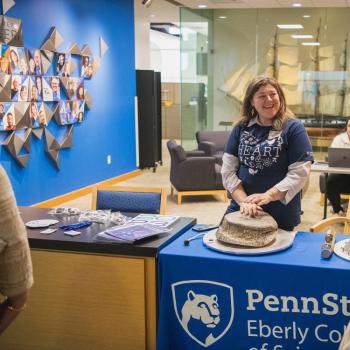“Our astronomy department is a worldwide leader in astronomy research in a broad range of fields. We have a long history of capitalizing on the public’s interest in astronomy to bring more advancements to a broader viewer base through popular outreach programs such as our AstroFest, Rockets for Inclusive Science Education, and teacher workshops, for example. We now want to take the next step to explore a venue where all of Penn State can share their knowledge with the world,” said Randall McEntaffer, department head and professor of astronomy and astrophysics in the Penn State Eberly College of Science, during the spring 2025 Johnson Lecture in Scientific Communication.

The lecture was held April 5 in the Jennifer Chalsty Planetarium at the Liberty Science Center in Jersey City, New Jersey.
“Today we would like to emphasize the importance of science communication and outreach, not only for our astronomy department but also for the Eberly College of Science,” McEntaffer said. “Today we would like to introduce you to new immersive theater technology and how it can be used for science communications and education at Penn State. Such technologies bring scientific discovery to wider audiences and are well aligned with Penn State’s land-grant mission.”
The immersive theater show began with Chris Palma, teaching professor of astronomy and astrophysics, showing the night sky over State College to more than 150 alumni, students, faculty, staff, and friends of the college.
“Old-fashioned planetarium projectors in the 1940s, that’s all they could do — show off the stars in the night sky; but the theme tonight is to show you that there’s so much more. These facilities are truly immersive theaters,” he said, as he flew the audience through Saturn’s rings, showing up close the rocks that the rings are made of. “They’re not just for the stars anymore.”
Learn more about the department's Penn State Planetarium on the Eberly College of Science website.

Palma continued his science communication and outreach talk by taking the audience on a video field trip to the arctic during a research fossil dig with biology professor Tom Stewart, exploring the microbiome up close, experiencing a demolition at a natural resource extraction site in Pennsylvania, and immersing the audience in a THON line dance and a Penn State football game.
“We can show the largest and most-distant things that we can see, but what would you think about taking a planetarium trip inside your own stomach?” Palma asked.
He also noted the collaborative and educational opportunities that cutting-edge immersive theatre technology could bring for faculty and students at Penn State, noting that education professor Julia Plummer is one of the few researchers in the country who focus on learning in the planetarium environment, and many students are studying disciplines like education, science, communications, and filmmaking who could learn from and use such a facility.
“If you want to design a movie, we need to know the science, we need the graphic designers, we need the storytellers, and then we need the film majors to help us put everything together,” Palma said. “These planetariums and theaters, you can do a live night-sky tour, or you can show a movie. All of this is not possible without technology and the experts to make it happen.”















